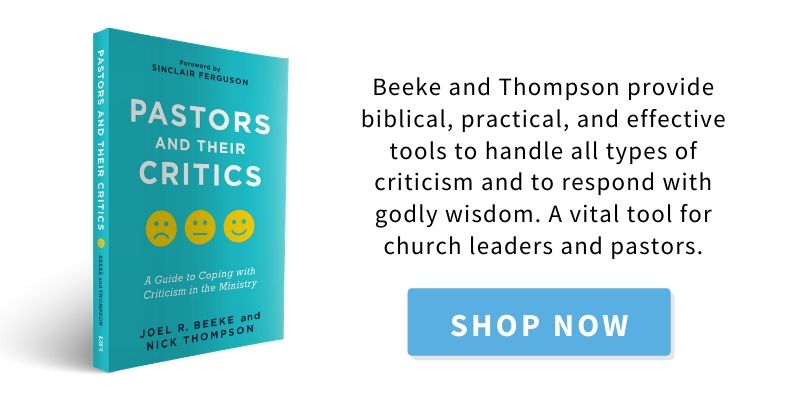The day has finally come. You have survived seminary, sustained your ordination exams, and been called to pastor a local church. You experience a profound eagerness in your soul as you step out to follow God’s call. You have a hopeful expectation that the sheep entrusted to your care will be built up in faith and holiness through your labors. You have a sanctified aspiration to bring the gospel to lost souls. You have an energy and excitement about the things of God more far-reaching than you have ever experienced before. What an awesome privilege it is to be a pastor, you think to yourself.
Soon, however, this sense of ministerial privilege begins to wane. What is the cause of the decline? The prospect that initially appeared bright as the noonday sun has quickly been overshadowed by the clouds of ministerial problems, and in particular, ministerial opposition. On the day of your ordination, dealing with criticism was the farthest thing from your mind. And as you think back on your seminary career, you can’t recall ever being taught how to handle such verbal opposition. But here you are, only months into the ministry and already the target of negative words. Perhaps it is your preaching they are unhappy with or the fact that you are not as gregarious as their previous pastor. Whatever it might be, you find yourself receiving verbal backlash. Sure, you expected such opposition from unbelievers. But from your own sheep? The disillusionment begins to sink in. It becomes a daily fight to keep the joys of knowing God, proclaiming His Word, and serving His people from being swallowed up by the harsh words of your congregants or colleagues in the ministry.
This is by no means an uncommon experience. While not every pastor experiences serious criticism from his people in the first months of his ministry, every pastor will meet with it sooner or later. As an old Dutch saying goes, “He who stands in the front will soon be kicked in the rear.”
While being criticized is a common pastoral experience, it is, by and large, an unaddressed problem. The majority of men being trained for gospel ministry are not being taught how to handle and respond to such verbal blows. And the consequences of this neglect are grave. A lack of training can quickly lead to disillusionment regarding the ministry, and in far too many cases, even resignation. Being on the receiving end of criticism for any length of time can result in exasperation, insomnia, cynicism, burnout, and even despair.
We have written this book to address this largely unaddressed problem. Helpful material has been written on the subject; as our footnotes will make plain throughout, there are valuable resources dealing with different facets of ministerial critique. But to date, we are not aware of a book that deals comprehensively with the various dimensions of criticism in the Christian ministry from a biblical and Reformed perspective. Such a work is urgently needed for pastors today.
Pastors and Their Critics is broken into four parts. In part one, we lay the biblical foundations for coping with criticism. Broadly tracing the theme of verbal flak from Genesis to Revelation, we seek to ground our understanding of the criticism we face today in its proper biblical and redemptive-historical context. In part two, we provide practical principles for coping with criticism in the ministry. This section comprises the bulk of the book, setting forth the biblical wisdom necessary to receive and respond to criticism in a God-honoring, Christlike way. In part three, we offer practical principles for constructive criticism in the church, discussing how to give criticism as a pastor and how to foster a culture open to criticism in your local congregation. We conclude in part four by setting forth a theological vision for coping with criticism in the gospel ministry, followed by an appendix addressing how to prepare while in seminary for the fires of criticism.
If you are not a pastor and have no aspirations for pastoral ministry, this book is still for you! While we have chosen to focus more narrowly on gospel ministry, the main truths and principles found herein apply to every Christian and every vocation. None of us are exempt from receiving or giving criticism. Thus, we encourage you to take up this book and read!
Pastors and Their Critics has been a joint collaboration, but because of Joel’s forty-plus years of pastoral experience, almost all the real-life scenarios found in these pages are his. He rather humorously, yet seriously, asserts that this is finally a book he feels qualified to write because he has had plenty of experience coping with criticism! Rather than continually clarifying this and drawing unnecessary attention to the author, we have decided to only make note when a personal example is from Nick’s experience. We trust this will not cause confusion.
As will become clear in the pages ahead, learning to cope with criticism and to give criticism in the Christian ministry is largely a matter of the heart. There are painful lessons we must learn here, and they are seldom learned quickly or easily. For this reason, we encourage you not to breeze through this book in an hour, but to prayerfully ponder and slowly digest it.
We pray that God will use Pastors and Their Critics to work the sanctifying influences of His Word in your soul and ministry, enabling you to endure with joy through the furnace of criticism and come out the better for it. As with any other cross, criticism cannot be so heavy that God’s grace cannot sustain you under its weight and enable you to profit from its pain.
—Excerpt taken from the Introduction to Pastors and Their Critics


Comments